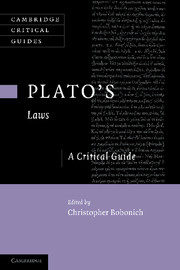Book contents
- Frontmatter
- Contents
- List of contributors
- Introduction
- 1 The Laws' two projects
- 2 The relationship of the Laws to other dialogues: A proposal
- 3 Ordinary virtue from the Phaedo to the Laws
- 4 Virtue and law in Plato
- 5 Morality as law and morality in the Laws
- 6 Puppets on strings: Moral psychology in Laws Books 1 and 2
- 7 Psychology and the inculcation of virtue in Plato's Laws
- 8 Images of irrationality
- 9 Family and the question of women in the Laws
- 10 The theology of the Laws
- 11 Plato's ‘truest tragedy’: Laws Book 7, 817a–d
- Bibliography
- Index
10 - The theology of the Laws
Published online by Cambridge University Press: 06 December 2010
- Frontmatter
- Contents
- List of contributors
- Introduction
- 1 The Laws' two projects
- 2 The relationship of the Laws to other dialogues: A proposal
- 3 Ordinary virtue from the Phaedo to the Laws
- 4 Virtue and law in Plato
- 5 Morality as law and morality in the Laws
- 6 Puppets on strings: Moral psychology in Laws Books 1 and 2
- 7 Psychology and the inculcation of virtue in Plato's Laws
- 8 Images of irrationality
- 9 Family and the question of women in the Laws
- 10 The theology of the Laws
- 11 Plato's ‘truest tragedy’: Laws Book 7, 817a–d
- Bibliography
- Index
Summary
INTRODUCTION
The opening word of the Laws is “god” (theos). The existence and nature of the gods is of central importance in this dialogue, and the focus of attention in Book 10. Yet much of what Plato says about them is imprecise or incomplete.
The Laws is a difficult work presented in relatively difficult Greek. Book 10 – arguably the most philosophically challenging of the dialogue's twelve books – is especially dense and (at times, it seems) unfathomable. This may in part be the result of its unfinished state. Diogenes Laertius famously reports that “some say that Philip of Opus transcribed the Laws, which was in wax” (III 37). It is not unreasonable to conclude that the Laws may have been in a less than polished state when Plato died. Further, to mention a problem not limited to the Platonic corpus, of course, the centuries-long transmission of this work from the fourth century bc to the medieval period doubtless left its marks on the text we possess.
Some of the ambiguities or uncertainties surrounding Plato's account of the gods in the Laws are likely the result of such causes. For example, one passage in his description of the atheistic conception of reality (10. 889b–e) is aptly described by Trevor Saunders as “stuffed with vague words of uncertain reference” (1972: 91).
The way in which the supervision of the universe by the gods would be easy – this is what I seem to be explaining. […]
- Type
- Chapter
- Information
- Plato's 'Laws'A Critical Guide, pp. 197 - 216Publisher: Cambridge University PressPrint publication year: 2010
- 2
- Cited by



